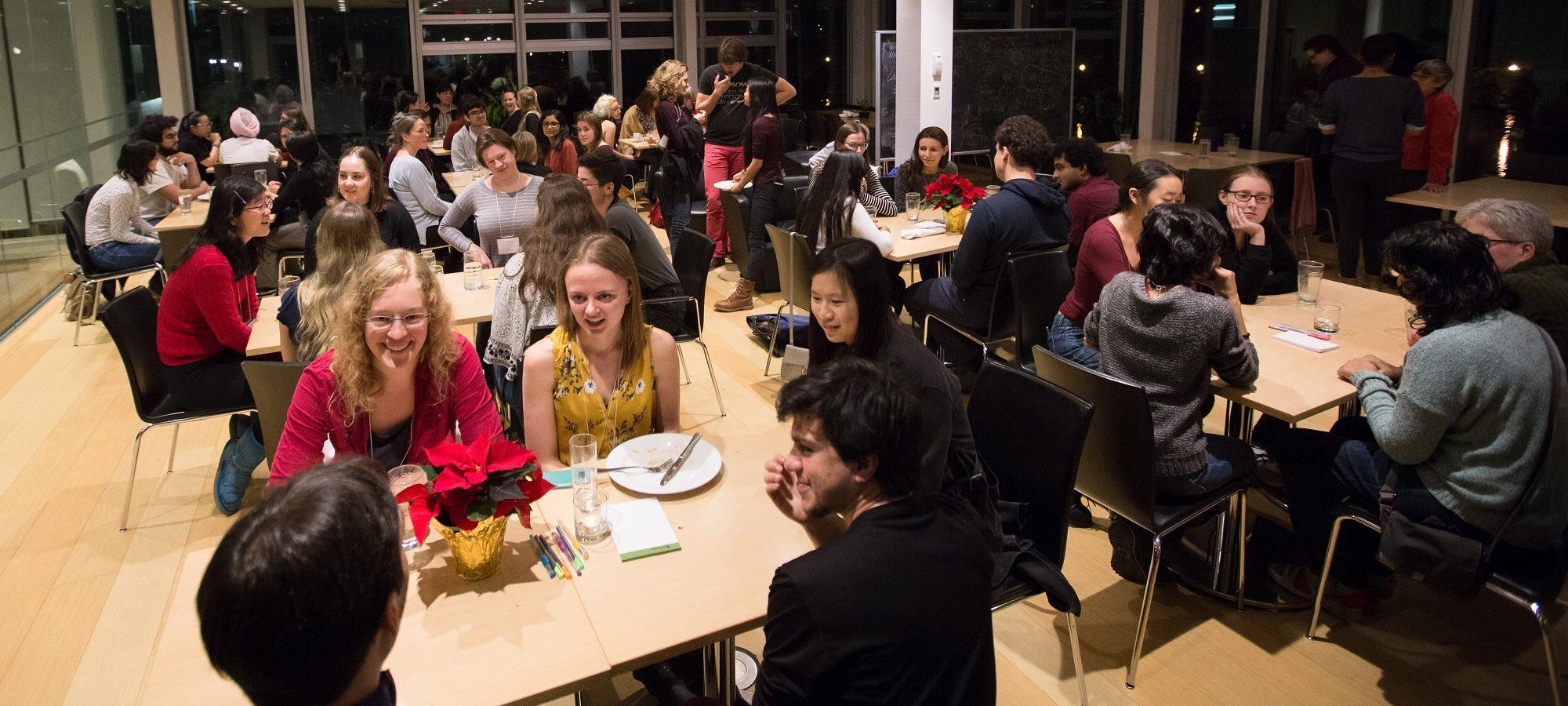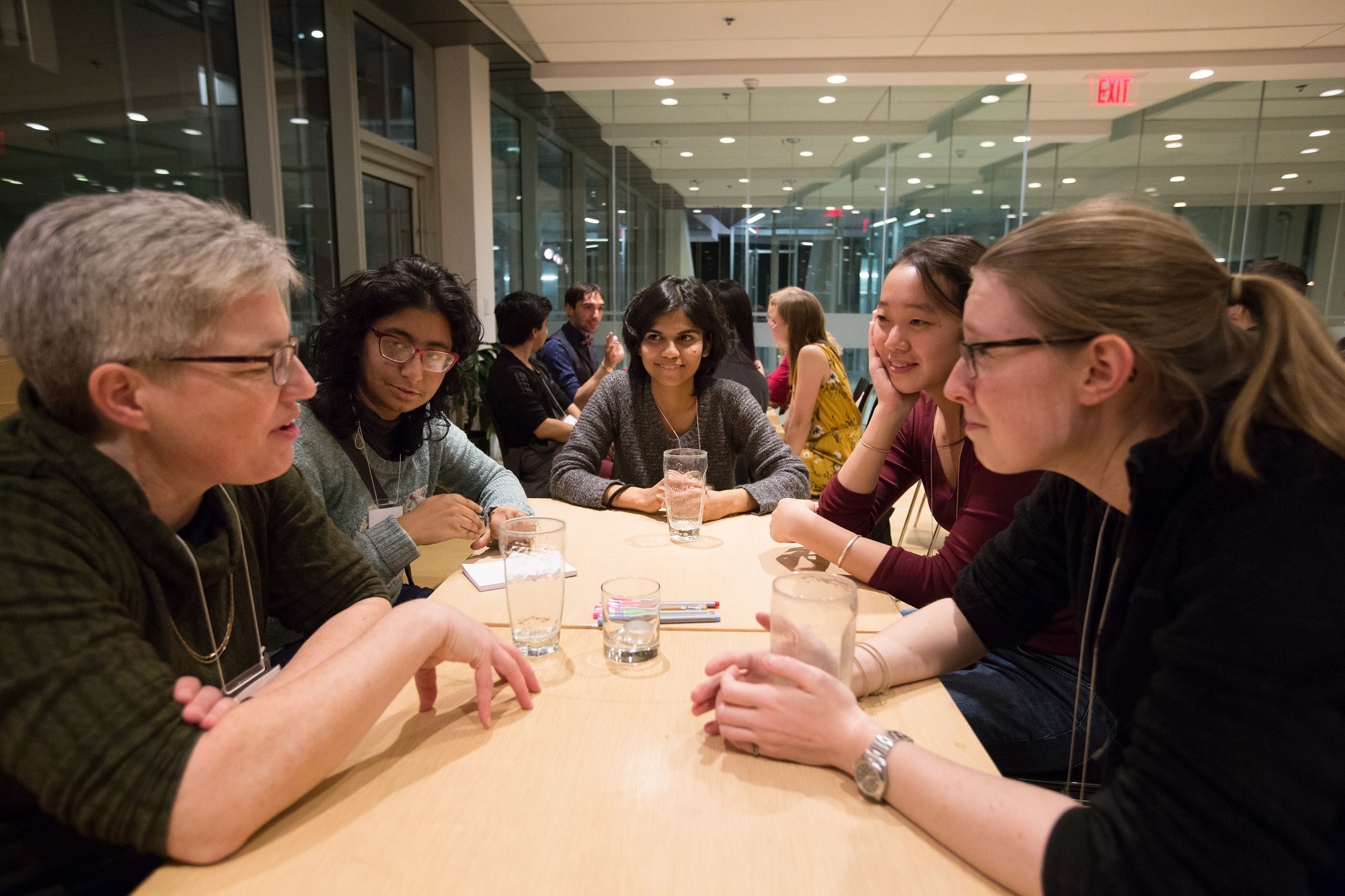Mentors urge students to be open to possibility
At FemPhys mentoring night, the focus is on practical issues and big potential, whether or not students stick with academia.
Take a self-guided tour from quantum to cosmos!
At FemPhys mentoring night, the focus is on practical issues and big potential, whether or not students stick with academia.

At first glance, the path to a career in physics might seem pretty straightforward: study the field at the undergraduate, master’s, and doctoral level, and then look for faculty positions (perhaps with a few postdocs along the way).
In practice, however, the path can be much more meandering and unpredictable – and you might end up in some fascinating and unexpected places.
A group of around 50 undergraduate and graduate students recently heard first-hand about where those twists and turns can lead, at a mentoring night co-organized by Perimeter Institute and FemPhys, a University of Waterloo group that brings together women, nonbinary individuals, and other minorities in physics.
Mentors included women postdocs and faculty, as well as professionals with physics backgrounds. Students were invited to chat informally with the mentors in small groups over dinner, rotating to a new table every 15 minutes.
The diversity of careers was a perfect mix for Kristine Boone, a PhD student at the Institute for Quantum Computing, who is at a fork in her own path as she decides whether to look for academic positions or make the leap into industry.
“I got a lot of perspectives from [people] continuing the academia trail. All of them seemed really happy with their jobs, and they were all very honest,” said Boone. “I also got the other perspective of what’s great about industry, and how you can actually use some of these skills to help industry or to build something.”
The event turned the spotlight on women physicists, but all students were welcome and encouraged to attend, regardless of gender identity.
“I think that it’s important for everyone to see strong women role models,” said Lei Yang, a PhD student at Perimeter and one of the event organizers. “I think that’s something that’s missed a lot of times: that it’s also very important for men to work with women and to see women as being present, as being equal.”
It can be a big boost for women early in their careers to see that people like them have made it work, even though they may have encountered difficulties along the way.
Margaret Fraser, a mentor and a Technical Marketing Specialist at Waterloo-based OpenText, one of Canada’s largest software companies, shared an example of discrimination she faced years ago. “My Grade 12 physics teacher walked in, looked around, and said ‘What are you girls doing here? Home ec[onomics] is down the hall.’ And he was not kidding,” she recalled. “Things have come a long way from that.”

Though such overt stereotyping might be rarer nowadays, it hasn’t disappeared completely. Boone, who studied astrophysics during her undergrad, said other students and professors repeatedly assumed she was in the wrong lecture hall at the beginning of the semester.
“They would write the name of the class on the board, and then just see if I was going to leave,” Boone said. “It’s never that I thought I wasn’t capable of it, it’s more that people have always assumed that I am incapable of it – which just sucks.”
Despite the initial lack of support from her physics teacher, Fraser went on to study condensed matter physics. After completing a bachelor and a master’s degree, she decided to put her graduate studies on hold.
“In theory, I was going to take some time, figure out what direction to go in,” she said. In the meantime, she got a job while her husband continued with his PhD studies. Watching him progress through his doctorate, Fraser realized she didn’t want to go back to grad school. “I saw how hard he was working and how passionate he was about his research. And I realized that I didn’t really have any question I wanted to answer that badly.”
Ultimately, Fraser is thrilled with how her career turned out. She’s happy to point out the many upsides that come with a non-academic career – like how she typically comes home from work at 5 pm, doesn’t often work on weekends, and still gets the satisfaction and enjoyment of learning new things.
But at the time, the choice wasn’t an easy one to make. Like many former academics, Fraser initially experienced a sense of failure for choosing a non-academic path. Dispelling that perception is a large part of her reason for being a FemPhys mentor.
“I felt that sense of failure for a long time for having left. It’s also important to say ‘Academia is great, but it’s not the only way. You can be happy and successful outside, and it’s not for everyone.’ Your path can take you to happiness, even if it’s a little different path than what you imagined.”
Knowing it’s okay to change your mind was reassuring to Delaney Dyment, a first-year physics undergrad at the University of Waterloo. “There are some people who did their PhDs in something and went into something completely different,” she said after speaking with several mentors throughout the night. “So it’s not necessarily the end of the line if you finish something that you end up hating. You can still turn it into something you love.”
Perimeter students, researchers, and staff share their experiences in celebration of the International Day of Women and Girls in Science.
Simons Emmy Noether Fellow Malena Tejeda-Yeomans is studying heavy ion collisions that recreate the first moments after the big bang.
A round-up of what’s up: the latest news from Perimeter, a look at the recent work of researchers and alumni, gems from the archive, and fun physics for everyone.